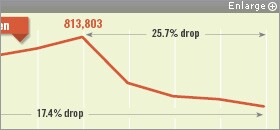A lot of attention has been heaped on the fact that more and more students are taking the SAT or ACT. But little notice has been given to an opposite trend: the quiet slipping away of the SAT Subject Tests.
Once known as the SAT IIs, and, before that, the SAT Achievement Tests, these single-subject, multiple-choice exams were long a staple of many high school students’ college applications, especially to the country’s more selective set of institutions. But an examination of reports from the College Board, which owns and administers the tests, shows a steep decline in the number of students taking them, especially in the past five years.
Across the five most recent graduating classes that the organization has published data about—the classes of 2011 through 2015—the number of subject tests given has dropped by 25.7 percent. Since the class of 2006, it’s dropped 17.4 percent.
By contrast, 1.7 million students in the class of 2015 took the SAT, up from 1.65 million four years earlier. About 1.9 million students took the ACT, a 19 percent increase from 2011.
Why are the SAT subject tests fading?
Many colleges and universities no longer require them. The University of California system’s 2009 decision to stop requiring SAT subject tests put a big dent in the number of tests taken and likely sparked others to make them optional, too. The beginning of the big decline in subject tests coincides with the entry of the first UC classes that didn’t need to submit SAT subject tests, about five years ago. The UC system is huge—in 2015 its freshman class pushed 200,000—but it isn’t the only one that’s dropped the SAT subject tests. Columbia University and Dartmouth College recently decided to make them optional, and many others have done the same.
Statistics point to the declining popularity of the SAT Subject Tests—both in the numbers of tests being given each year and in the numbers of students who are taking them.

Source: College Board
In dropping the SAT subject-test requirement, the University of California said the tests created difficulty for low-income students. Unlike their wealthier peers, low-income students often hadn’t been advised to prepare for those tests, so they found themselves at a disadvantage when it came time to apply. UC leaders also said that on top of high school transcripts and the SAT, the subject tests didn’t add much value to the process of evaluating applicants.
The College Board’s introduction of an essay to the main SAT exam in 2005 might also have fueled a downward trend in the use of the subject tests: The organization dropped its subject test in writing in 2006. The College Board made the essay portion of the main SAT optional when it redesigned the exam for 2015.
Which Tests Are Better?
Some view the decline in the use of the subject tests as ironic, since many academics see them as better indicators of students’ true academic accomplishments than the main SAT, which has been widely criticized as coachable and a proxy for socioeconomic advantage.
A 2008 report by the National Association for College Admission Counseling, or NACAC, found that the subject tests were better predictors of first-year college success than the SAT or ACT. But Harvard University’s dean of admissions, William R. Fitzsimmons, told Inside Higher Ed in 2010 that his institution dropped the subject test in writing because the new SAT essay filled that role.
Many colleges and universities still require—or consider—SAT subject tests, however, so counselors and test-prep providers often advise students to take them.
“SAT subject tests can often be a great way to show your depth of knowledge and present yourself as a more competitive candidate,” Revolution Prep, a for-profit test-preparation company, says on its website.
Even institutions that no longer require the subject tests don’t exactly discourage students from taking them.
“While SAT subject tests are not required, some campuses recommend that freshman applicants interested in competitive majors take the tests to demonstrate subject proficiency,” the University of California says in the admissions section of its website. “Remember, these are recommendations, not mandates. You will not be penalized for failing to take the SAT subject tests. On the other hand, submission of these test scores (just like submission of [Advanced Placement] and/or [International Baccalaureate] scores) may add positively to the review of your application.”
Small but Stable Role
Such advice might explain in part why the NACAC, which surveys its college and university members about the factors they consider in admitting students, hasn’t seen as steep a drop in their use of the SAT subject tests as the College Board figures suggest they might.
A small but stable proportion of institutions consider the tests important. Between 2006 and 2014, 4 percent to 7 percent of NACAC’s members said they attach “considerable importance” to the SAT subject tests, a range that held steady in 2015.
There’s been a bigger rise, however, among those who don’t consider the subject tests important. Between 2006 and 2014, 55 percent to 60 percent of NACAC’s institutional members said the subject tests have “no importance” in admissions, but in 2015, that number rose to 70 percent.
“I would like to see another year of data before declaring a trend,” NACAC’s associate director of research, Melissa E. Clinedinst, said in an email, “but this increase in the percentage of colleges rating SAT II tests with no importance is certainly consistent with a decline in usage.”
Zach Goldberg, a spokesman for the College Board, said preliminary registration figures for 2015-16 suggest that more students took SAT subject tests last year than in 2014-2015, but he declined to provide an exact number.



